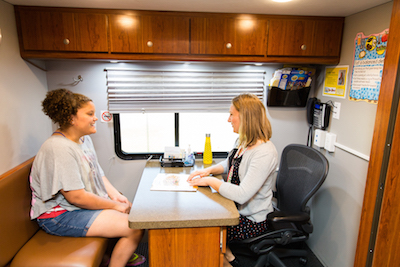All Search Results
-
How post-traumatic stress disorder affects families in the NICU
Within our hospital system, we care for patients with all types of illnesses and health concerns. One of the things many people probably don’t recognize, though, is that along with the treatment of physical issues, our caregivers also provide for the mental and emotional needs of our patients and their families to ensure the health and wellbeing of the whole person. Since May is Mental Health Awareness Month, we have a great opportunity to learn a little more about what mental health professionals do in our hospital and learn important information about some of the mental health issues that patients or their families may face.
-
Can a smart device save your baby’s life?
If there were a device available for purchase that could protect your infant from sudden, unexplained death and keep your family from the pain and suffering of the loss of a child, would you buy it?
-
How to help your kids get the most out of playing sports
Why are your kids playing sports?
-
So you have a child that isn’t talking yet. What should you do?
As a pediatric Speech-Language Pathologist, I see children with a variety of speech and language disorders. One of the most common is what is known as expressive language delay, which is when a child is not using the vocabulary and phrase/sentence length that is appropriate for their age. Although there can be specific medical reasons for the delay, it can also happen with no other diagnosis. For those kids who seem to understand everything but are not communicating at their age level, I encourage parents to work on building their child’s “intent to communicate.”
-
How we help teens get healthy in a healthy and enjoyable way
The Teen Xpress program is part of the Howard Phillips Center for Children and Families. We offer health care, mental health counseling, case management, and nutrition and dietary services to teens at select schools in Orange County. As the Teen Xpress mental health therapist, I meet with adolescents every day that are interested in changing their lives. Usually, the teens I work with want to make changes behaviorally or emotionally, but they often also express interest in making physical changes as well. It is not unusual to hear teens say that they want to lose weight.

-
One dietitian's secret to helping your whole family drink more water
We all know it is important to drink at least 8 cups of water per day for proper hydration. Unfortunately, some of us (like myself) have a difficult time meeting this recommendation due to the “boring” taste of water. Sometimes powdered sugar-free drink mixes can be a good option, but for some people it might not be.
-
How you can protect your teen from substance abuse?
Over the last few years there has been an increase in the number of teens who are not only experimenting with drugs, but who have developed an addiction problem. According to statistics, about 2 million children between the ages of 12 and 17 are in need of treatment every year. Most teens do not experiment with drugs with the intention to become addicted to them. In fact, most teens experiment with drugs because of curiosity, peer pressure, or to feel good and have a good time. Unfortunately, many continue and many die because of it. As caregivers, it can be challenging to know what to do because addiction is brooded in secrecy and we might not find out until the substance use has become a substance abuse problem.
-
How to Choose and Pack a Backpack to Be Sure It's Safe for Your Child
As a pediatric occupational therapist, I work with kids to help them become as independent and successful as they can be in their daily tasks and activities. This includes teaching kids to lift and carry items in the most efficient and safe ways for their bodies. Backpacks are a part of your child’s daily school routine, and choosing the right one can affect your child in ways you might not expect.
-
Living with Gastroparesis: Step into one patient's shoes as she lives with a chronic illness
I’m 18 years old, and I have a disease known as Gastroparesis, which means that my digestive tract is paralyzed and unable to digest food. I have been managing this disease for about 3 years and while I do sometimes have to stay in the hospital, I have learned how to take care of many of my medical needs at home. Stay tuned throughout the day for more pictures of me as I manage my daily routine.
-
Injuries from nursery products are on the rise. Find out how to keep your baby safe.
I remember a time nearly 8 years ago when I was preparing for the birth of my first child and a friend gave me a sleep wedge as a gift. I’d never heard of a sleep wedge, but she said a friend told her it was a lifesaver for getting a baby to sleep.






